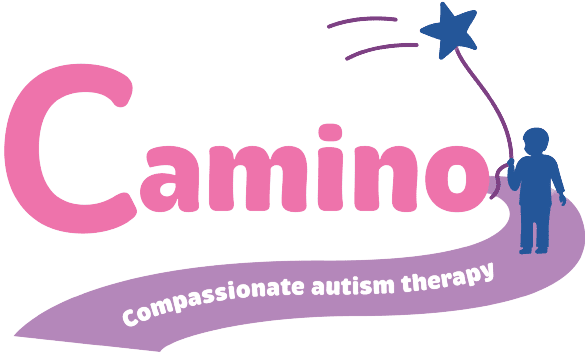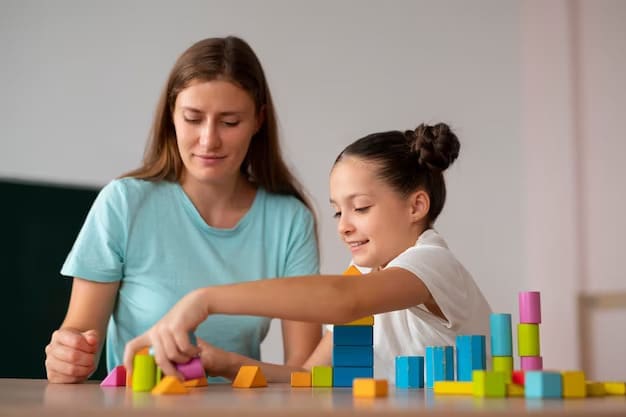Applied Behavior Analysis (ABA) therapy is an effective, evidence-based treatment for individuals with autism spectrum disorder (ASD).
ABA is a scientific approach to understanding and implementing meaningful changes in behavior. ABA therapy involves examining the role of environmental factors in shaping behavior and finding ways to modify these factors.
At Camino, we offer compassionate, personalized ABA treatment options for both children and teens with ASD.
In this blog post, we’ll discuss our 4-step approach to ABA therapy in Albuquerque.
1. Child Receives Autism Diagnosis or At-Risk Diagnosis
Before ABA therapy can begin, your child must receive an autism diagnosis from a licensed diagnostician.
Alternatively, Medicaid members can receive an at-risk determination from their pediatrician, allowing them to begin ABA therapy in Albuquerque prior to receiving an official diagnosis.
The diagnostician will be looking for abnormalities in certain behaviors and skills:
- Communication
- Social skills
- Restrictive behaviors
- Repetitive behaviors
Early intervention can significantly improve developmental outcomes and provide children with the necessary skills and support they need to thrive throughout their lives.
Once your child receives an autism diagnosis, we can conduct an initial behavior analytic assessment.
2. Behavior Analytic Assessment
The first step in a behavior analytic assessment is gathering information about your child’s developmental history, medical background, and current behavior through an in-depth interview with you.
Next, our professionals will assess your child’s current repertoire of skills, which involves observing their abilities in various areas. This allows us to identify strengths and weaknesses and tailor the intervention accordingly. We’ll also prescribe treatment hours.
Expressive and Receptive Communication Skills
Expressive and receptive communication skills are pivotal for effective social interactions and learning.
We’ll assess how well your child can express their needs, wants, and thoughts, as well as their ability to understand and comprehend language and instructions.
Visual Perceptual Skills
Visual perceptual skills are another area of assessment, as they play a vital role in understanding the environment, recognizing shapes, colors, and objects, and processing visual information.
Social Skills
Social skills are assessed to determine how well your child interacts with peers, adults, and the larger social environment. This includes initiating and maintaining conversations, understanding social cues, and demonstrating appropriate social behaviors.
Imitation Skills
Imitation, a fundamental learning process, is evaluated to see how well the individual can mimic actions and behaviors demonstrated by others, which is crucial for learning from modeling.
Play Skills
Play skills assessment helps us understand how your child engages in activities such as symbolic play, turn-taking, and imaginative play, which are essential for social and cognitive development.
Finally, we’ll thoroughly assess challenging behaviors, seeking to identify the underlying causes and triggers.
The results of this assessment allow us to create a tailored intervention plan that addresses individual needs and helps your child make significant progress in their behavioral, social, and cognitive development.
3. Applied Behavior Analysis (ABA) Treatment Plan
Once the assessment process is complete, Board-Certified Behavior Analysts (BCBAs) will collaborate with you to develop an individualized treatment plan consisting of three main components.
Skill Acquisition Goals
Skill acquisition goals focus on the development of new skills and behaviors.
These goals can encompass a wide range of areas:
- Communication skills
- Social skills
- Daily living skills
- Academic skills
BCBAs work closely with individuals and their families to identify specific skills that need improvement and set measurable objectives. They’ll break down each skill into smaller, achievable steps and utilize evidence-based techniques to teach and reinforce the desired behaviors.
Behavior Reduction Plan
Behavior reduction plans are designed to address challenging behaviors that may interfere with your child’s functioning and daily life:
- Aggression
- Self-injury
- Tantrums
- Repetitive behaviors
Based on the behavior analytic assessment results, BCBAs develop strategies to replace the challenging behavior with more appropriate alternatives.
These strategies may include teaching the individual alternative coping skills, implementing reinforcement systems, and modifying the environment to prevent triggers.
Parent Goals
ABA therapy recognizes the crucial role of parents and caregivers in the success of the treatment. Parent goals are included in the treatment plan to empower and support you in implementing ABA strategies consistently at home.
You’ll be provided with training and guidance on how to reinforce and generalize the skills learned during therapy sessions to the natural environment.
As a parent or caregiver, there may be a variety of goals you wish to achieve:
- Learning behavioral management techniques
- Implementing visual supports
- Creating structured routines
- Fostering a supportive and inclusive environment
By actively involving you in the therapy process, our treatment plan promotes the generalization of skills and ensures that progress is maintained beyond the therapy sessions.
4. ABA Treatment Begins
Parent meetings and re-evaluations are essential aspects of our ABA therapy in Albuquerque.
Monthly Family Guidance Meetings
Treatment will begin with monthly family guidance meetings, which will provide an opportunity for you to stay informed about your child’s progress, understand the strategies being used, and learn how you can reinforce and generalize skills at home.
The ABA therapist can also discuss the specific goals being targeted, review data collected during sessions, and address any concerns or questions you may have.
By keeping you involved and knowledgeable, these meetings ensure that everyone is on the same page and working towards the same objectives.
Semiannual Re-Evaluations
In addition to meeting with you regularly, we’ll conduct re-evaluations every six months. These re-evaluations serve as a checkpoint to assess the progress made and determine if any modifications need to be made to the treatment plan.
At Camino, our ABA treatment plans are highly individualized, as we understand that the needs of a child may change over time.
By conducting regular re-evaluations, our ABA therapists can ensure the therapy remains effective and continues to address your child’s evolving needs.
Get Personalized ABA Therapy in Albuquerque at Camino
At Camino, we prioritize personalized, trauma-informed care. Our compassionate and dedicated approach ensures that every child and teen receives the specialized attention they deserve, fostering a supportive and inclusive environment that promotes positive outcomes.
We’re dedicated to making a meaningful difference in the lives of our patients, empowering them to achieve their fullest potential and thrive in all aspects of life.
Contact us today to learn more about ABA therapy in Albuquerque.

